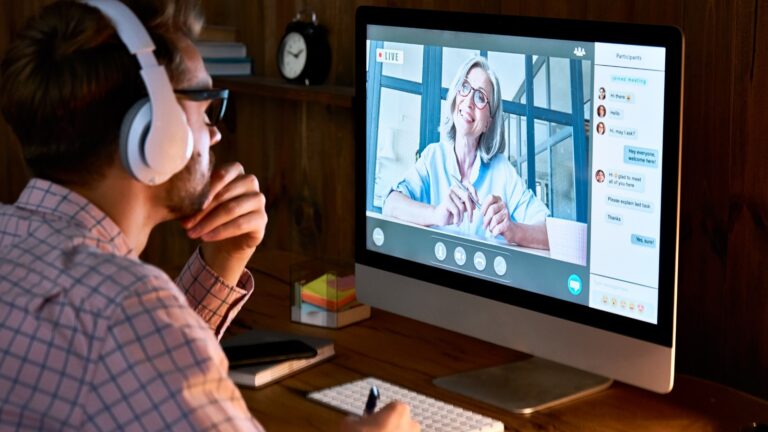Webinars and seminars refer to the same concept. It is a meeting held to exchange helpful information with a large audience. The only difference between the two is that while seminars have occurred for the longest time in schools, universities and professional contexts in a physical location, webinars are conducted online. Webinars are, in that sense, a relatively new concept introduced by COVID-19. With the rise of video conferencing platforms like Zoom, Microsoft Teams and Google Meets, it has been easier to host a webinar online, allowing a diverse audience to join from any part of the world with access to the internet. Ever since webinars were introduced, it has given more access and opportunities for others to be part of a conversation which may, up until then, have restricted them due to the financial costs involved in travelling to another country or state, for example. This article will consider the relevance of seminars in today’s context.
Benefits of Hosting A Webinar

A webinar offers a range of benefits compared to adopting a traditional seminar. Here is why many corporations are cutting down their budgets by preferring to conduct an online webinar discussion:
The Obvious: Widen Your Reach
Getting people to attend is one of the hardest things to do when organising a seminar. Since a seminar involves a ticket and requires one to travel and dress appropriately, the number of people that may be interested or can afford to attend is quite limited. As a result, companies often maximise their efforts to find people and fill in the space. In an online setting, however, it is comparatively easier to get people to attend. It is as easy as asking one to register by clicking a link and filling out a form. Since the notification is also sent a few minutes before the webinar starts, you can guarantee that many people will still attend. All the attendee needs is a device with the software downloaded and an internet connection. Since you can tune in from anywhere worldwide, you do not have to worry about being fully presentable and can listen comfortably.
Pull off A Global Event Cost Effectively
It is no secret that organising an event with so many people takes enormous amounts of money from your budget. Not only are funds required to book the venue, but the price for resource persons, sound systems, screens, food and others all add up to millions. In contrast, the only investments needed for a webinar are the video conferencing platform and the charge reserved for resource persons. This is a common reason why most online webinars are free of charge, although this may not always be the case. Since webinars cost very less, it allows any kind of company, be it large, medium or small, to host something and establish their reputation. Even when it comes to printing materials, the price that would have gone for a seminar is completely removed. Hence for half the cost, build your brand and generate leads. The controlled environment a webinar provides removes external risks associated with a seminar.
Record and Share After
The great thing about online platforms is that everything can be recorded. Hence, one or more people hosting the event can record and post the recording, allowing those who missed the webinar to watch it. Alternatively, since these platforms can also integrate with social media pages, you can live stream the event, notifying your followers to also tune in. While it is possible to broadcast an event live, even in a seminar, the amount of effort and work it entails is a lot. For instance, you need to set up a team of cameramen and a technical team to handle it from start to finish. They need to ensure the visual and audio do not falter. In a webinar, everything is so simple. With the user-friendly interface of most platforms, organisations can easily record the event with no problem. As a bonus, recorded webinars automatically generate transcripts, whereas an event recorded in person will need captions to be manually added.
Directly Ask Questions and Clarify Them
In a seminar, a person must be confident to raise their hand and ask a question. Once someone does, a member of the organising team needs to run up to that person with a mic. All this takes a certain amount of time, and when an event is running on a schedule, few get an opportunity to clarify their questions. In a webinar, however, the audience can either unmute themselves and ask a question or even put it in a chatbox. This allows wider engagement and encourages even those who may lack the courage to raise their hand in person to clarify their queries. It also allows the audience to ask questions during the event by typing them in the chatbox. Usually, these questions are later asked by the moderator. Since the panellist can also see them, they can carry on the conversation by answering them in their presentation. This saves time and keeps the audience’s attention engaged.
What is Unique About Hosting A Seminar, Then?
While webinars and seminars have a range of similar features, do the advantages webinar offers give them a better edge? Seminars, although restricted specifically in terms of access, do continue to have relevance even today. Here is what hosting a seminar brings to the table:
Event Managers Can Charge A Tickets
Since physical events require companies to invest a lot of money in organising, charging a seminar fee is normal. As a result, some portion of the finances used can be regained. As many understand the number of finances it takes to host the event, there is a general perception that it is fair to charge for a seminar ticket. Hence, a company hosting a webinar that tries to charge a ticket may find it hard to get registrations. Moreover, physical events allow you to gain sponsorships from other organisations allowing them to market themselves during the event. These types of partnerships demonstrate your brand’s quality and contribute to marking your presence as an authoritative business leader. It is very rare to find anyone taking the effort to find sponsorships in webinars, making it harder for companies to demonstrate the number of partners that have endorsed the event.
Social Events Are Mainly About Networking
One of the main reasons people attend corporate events is not to listen to a discussion. It is to network with other colleagues in your field. As is often noted in the business world, power is demonstrated by your acquaintances. Your connections are a way of telling others where you stand and whose attention you have gained. Hence, one of the key incentives to attend seminars is to meet and add people to your professional networks. It is one of the best ways to gain different perspectives on different subject matters, encouraging you to do a new project in a new light. It specifically helps professionals advance in their careers, find the perfect partner or may even give you the starting step to enter the job market. While attempts have been made to network in webinars through creative platforms that allow a person to create an avatar of themselves, nothing beats meeting a person face to face and sparking up a conversation.
People are More Prone to Engage Throughout The Event
Although online platforms offer everyone the opportunity to ask their questions, the number of people in the webinar starts to drop out after a certain time. This shows humans have a shorter attention span when facing a virtual screen. Hence a typical webinar will have much engagement only for around an hour. This may not be the most effective, especially if it is a wide-scale webinar that is being hosted. Imagine a three-day seminar being transitioned to a three-day webinar series. In a seminar, the number of people would stay consistent, whereas, in a webinar, you may have a lower turnout from the previous day. It is even harder to have multiple webinars in a day. On the other hand, seminars can go all day because of the breaks in the middle. Whether it is a break for food or networking, the interest one has in attending the seminar continues. In other words, anyone that signs up for a three-day seminar is bound to show up on all days.
You Do Not Need High-Speed Internet
The success of a webinar relies on the strength of the internet connection. Suppose the weather is unfavourable towards the moderator’s or speaker’s connection. In that case, if a smart device is unavailable or if the mic is not working, any technical difficulty could hinder a webinar from occurring. Since the organiser cannot control the external conditions of the resource person, there is minimal control in being consistent. For example, not everyone’s video quality will be good enough. The worst part is that while such difficulties occur, there is nothing for the audience to do but wait. Prolong waiting could lead them to leave the platform before the session starts. In a seminar, however, if a technical difficulty occurs, it is not the end of it. Either a quick solution pops up, or until the problem is rectified, the audience does not have to waste time staring about but can walk and network with their peers.
Webinars Vs Seminars: Is There A Winner?
It is hard to say that a webinar is better than a seminar. At the end of the day, both have unique advantages which make them better than the other in certain situations. It comes down to the company that is organising it. For example, does a company have the necessary finances to organise a seminar? If not, the only viable option is to have one online. Whichever option you choose, you can still use it to enhance your company’s brand and drive ahead.






